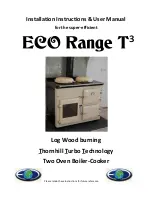
7
Surface Cooking
Note:
Always use a utensil for its intended purpose. Follow manufacturer’s
instructions. Some utensils were not made to be used in the oven or on the
cooktop.
*GOOD
• Flat bottom
and straight sides.
• Tight fitting lids.
• Weight of handle does not tilt pan.
Pan is well balanced.
• Pan sizes match the amount of
food to be prepared and the size of
burner.
• Made of material that conducts
heat well.
• Easy to clean.
POOR
• Curved and warped pan bottoms.
• Pan overhangs unit by more than
2.5 cm (1”).
• Heavy handle tilts pan.
• Flame extends beyond unit.
Pans should have flat bottoms.
Check for flatness by rotating a
ruler across the bottom. There
should be no gaps between the
pan and ruler.
*
Specialty pans such as
lobster pots, griddles and
pressure cookers may be
used but must conform to the
above recommended cookware
requirements.
usInG The GRIddle
Figure 1
Figure 2
Side with grooves
The griddle is intended for direct food cooking and can be used on both
sides (Figures 2 and 3). Do not use pans or other cookware on the
griddle. Doing so could damage the finish. With the grate in position over
the burner, set the griddle on top of the grate positioning the notches in
the griddle over the grate fingers (Figures 1 and 2).
!
caution
Always place the griddle on the grate before to turn on the burner.
Always use potholders to remove the griddle from the grate. Allow the griddle to cool before
removing. Do not set hot griddle on surfaces that cannot withstand high heat; such as countertops.
Be sure the griddle is positioned correctly and stable before use to prevent hot spills and possible
burns.
Figure 3
Flat Side
suRfaCe CookInG uTensIls






































